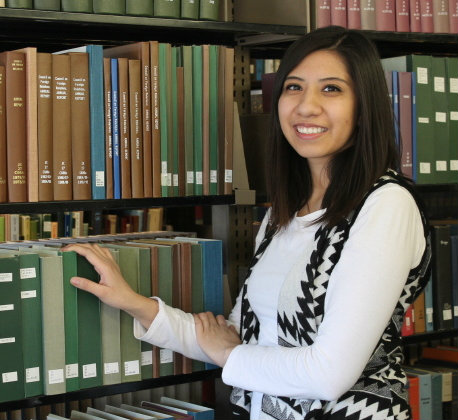
Senior sociology and ethnic studies major Sheila Soto has always had an interest in serving communities. Since May 2013, Sheila has worked in the Healing Pathways and REACH (Research, Evaluation & Analysis for Community Health) lab at UNL, in which Sheila and researchers such as Dr. Les Whitbeck studied the development and mental health of Indigenous adolescents. Sheila is also involved in the human rights advocacy group Nebraska Appleseed.
In spring of 2014, Sheila learned about the USTARS program as yet another way to further both her research and community service efforts. As a USTARS (Undergraduate Sociology Teaching and Research Student), Sheila was able to participate in research, as well as receive funding for her work. After being accepted into the program, Sheila became involved in a pilot study with Post-Doctoral Research Associates Dr. Brian Armenta and Dr. Miriam Martinez during summer 2014.
In this study, Sheila, Dr. Armenta, Dr. Martinez, and several other undergraduates conducted a series of interviews among fifty Latino individuals in rural communities throughout eastern Nebraska. In these interviews, participants were asked questions concerning their access to health care and the stress they experienced throughout their day. Participants in the study could trace their family origins from several different regions of Mexico, and were employed in fields ranging from meat-packing, agricultural work, to home-making.
These interviews, which were conducted in either English or Spanish, presented challenges for Sheila and her mentors. For some interviewees, the word “stress” was not a part of their vocabulary.
“In many forms of Spanish, ‘stress’ is not as commonly used as it is in English,” Sheila said. “So in interviews, we had to use a lot of descriptors, such as anxiety or worry, to get the kinds of answers we needed.”
After transcribing the interviews toward the end of the summer, Sheila then used some of the interview answers from this pilot study as the basis for her own undergraduate thesis. As the original pilot study continues to be coded, Sheila will specifically look at nineteen interviewees from this study who worked in the meat-packing industry. Sheila hopes to determine what limits some interviewees from seeking health care. She is currently coding these interviews to find commonalities between interviewee responses.
Since completing her USTARS internship, Sheila’s research efforts have been ongoing. Yet despite how busy she has been, Sheila has still found time to be thankful for the opportunities and knowledge being a USTARS has provided her.
“I never knew exactly what I wanted to do before my USTARS research,” Sheila said. “I always wanted to work in a non-profit setting, and after working with and talking to my mentors, I now know for sure I want to pursue a career in public health.”
Sheila is currently working on her undergraduate thesis and applying to graduate school. In the near future, she hopes to earn her Master’s degree in public health from Oregon State University.
Story by Lane Chasek